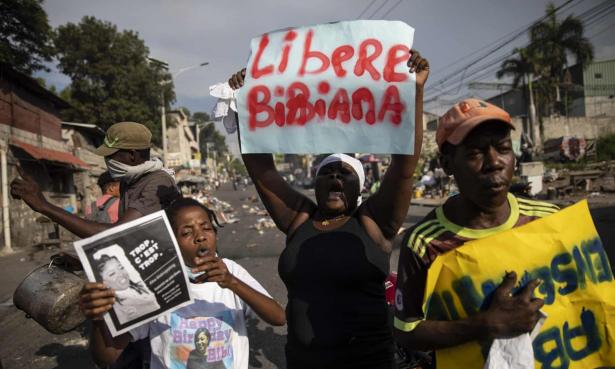‘Haitians are Kidnapped Every Day’: Missionary Abductions Shed Light on Growing Crisis
Firel Joseph was driving through Haiti’s capital, Port-au-Prince, one evening this year when he noticed a white Toyota Land Cruiser with official license plates trailing close to his rear bumper. Assuming the other driver wanted to overtake him, the 44-year-old development worker gave way. Then things took a hellish turn.
The car skidded to a halt in front of Joseph, while another vehicle appeared behind, boxing him in. Six men, wearing flak jackets and armed with rifles, piled out of the Land Cruiser, moving with military discipline.
Four of them waved the traffic away from the scene, shouting that they were police officers, while two approached Joseph.
“That’s when I realized I was in trouble – when they walked towards me and cocked their rifles and it made a noise just like in the movies,” Joseph said. “That’s when I knew I was being kidnapped.”
Haiti is the kidnapping capital of the world, where rich and poor alike are targeted for ransom – the victims often picked opportunistically from the gridlock traffic of Port-au-Prince.
Until recently, the epidemic of abductions had barely registered outside the country as it struggled with overlapping crises from natural disasters to the assassination of its president.
But on Saturday, 16 American missionaries and one Canadian were kidnapped while traveling by bus to the airport, thrusting the wave of kidnappings into the spotlight. Five children were among the hostages, including an eight-month-old baby. Their ransom has been set at $1m a person.
“There’s obviously lots of coverage because they are American, but Haitians are getting kidnapped every day,” said Joseph, who asked not to use his real name. “Sometimes it makes the news, but sometimes nobody cares.”
At least 628 kidnappings have taken place in Haiti this year – more than three times last year’s total, according to the local non-profit Center for Analysis and Research in Human Rights. The increase in abduction mirrors the growing power of violent criminal gangs. Approximately 165 factions operate in the capital city, often with tacit support from politicians, and many groups are now better armed than the country’s ’s fragile police force.
In April, the “400 Mawozo” gang – the same group officials said was responsible for Saturday’s mass kidnapping of missionaries – seized 10 people including seven members of the clergy, prompting the Archdiocese of Port-au-Prince to warn that Haiti was facing a “descent into hell”.
In July, president Jovenel Moïse was shot dead in his home; days later a 7.2-magnitude earthquake struck the country’s southern peninsula on 14 August and killed more than 2,200 people. Amid the chaos, gangs have seized their moment.
“The bigger the fish they catch, the fewer people they have to kidnap,” said Jay Cantave, who runs Brisec, a private security firm in Port-au-Prince. “It’s the most lucrative crime right now in Haiti, and people are getting away with it – and getting away with a lot of money.”
After Joseph was forced from his car, he was bound and blindfolded and driven to a safe house, where he was interrogated. Under duress, he unlocked his phone so the kidnappers could go through his correspondence and set a ransom. After making contact with his brother, they set the payout at $1.1m, to be paid in cash – in US dollars and Haitian gourdes.
“They set the price so high that you are scared, so that you will pay whatever you can,” Joseph said. Eventually, $15,000 was paid to secure his release, with Joseph borrowing from friends and family. “I’m still paying them back each month with each paycheck I receive.”
In neighborhoods controlled by gangs, residents are often detained and vetted to see if any ransom would be forthcoming before they are kidnapped.
Theodor Ronald was taken in May by two men on the streets of the Martissant neighbourhood. He was interrogated for three hours at a safe house before his captors decided he was too poor to be worth ransoming.
“Over here, anything can happen,” Ronald said at a shelter for those displaced by gang violence, where has been staying with thousands of others since June. “It’s your own fellow brothers with evil thoughts that go crazy and violent.”
Some observers say continuing lack of opportunity in Haiti risks bolstering the ranks of gangs. Haiti is the western hemisphere’s poorest country, with over 40% of its population food insecure.
“At the end of the day, the foot-soldiers in the gangs have nothing to lose and no real alternatives,” said Fiammetta Cappellini, country representative for the NGO Avsi. “We don’t want to limit the scope of the problem to economics, but there is a factor of poverty and a lack of resources at play.”
But with no clear end in sight to the country’s woes, many Haitians are struggling to adjust to life in a country where kidnapping is a daily reality.
“I just try not to be on the street too much and I try to get home early and to follow the news,” Joseph said. “But I don’t know what to do now because everywhere is a stronghold of the gangs.”
Joe Parkin Daniels is a British journalist based in Bogotá, Colombia, where he covers human rights, the country's internal conflict, and health. He tweets at @joeparkdan


Spread the word